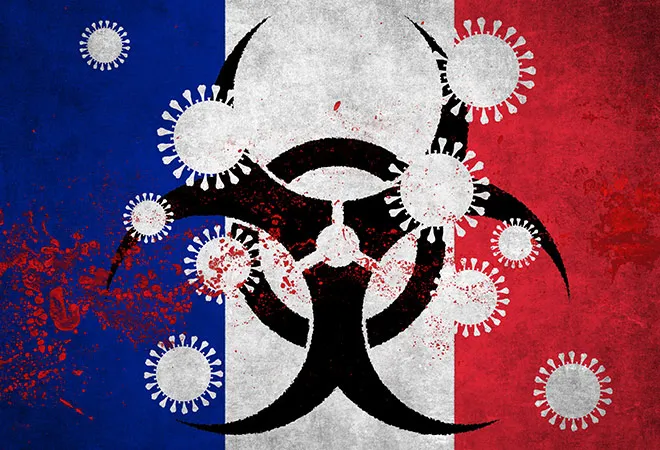
The Covid-19 pandemic has put immense pressure on the French healthcare system, known for being highly efficient, revealing both its strengths and weaknesses.
Here is a timeline of Covid-19 spread and government interventions in France from 24 January to 10 April
- 24 January 2020: The first three cases are officially recorded in France.
- 17 to 21 February: An evangelical gathering in Mulhouse (Eastern France) brought together nearly 2,500 people and contaminated over a thousand people.
- 23 February: Health Minister Olivier Véran triggered the Orsan plan (a response mechanism to deal with urgent health threats). The first stage of this plan consists of stopping the introduction of the virus on the national territory.
- 29 February: Stage-2 of the Orsan plan was triggered which aims to limit the spread of the virus. 100 people were infected and two died. The main source of contamination was in Oise (a department north of Paris) with 36 cases. In this territory, schools decided to shut down, gatherings were banned, and residents were asked to limit their movements. At the national level, events bringing together more than 5,000 people had to be cancelled.
- 9 March: Gatherings of more than 1,000 people were prohibited.
- 12 March: President Emmanuel Macron announced the closure of daycares, all schools from elementary to high schools as well as universities. An expert scientific committee was set up to counsel the government that consists of 12 scientists (MD, two sociologists and anthropologists).
- 14 March: Stage-3 of the Orsan plan was triggered. 4,500 cases were confirmed with 91 deaths in hospital. All "non-essential" public places were closed except pharmacies, banks, grocery stores, oil stations, tobacco shops and newsagents. The entire population had to start limiting its movements. However, local elections were maintained on 15 March.
- 27 March: Prime Minister Édouard Philippe extended the shelter-in-place order until 15 April at least.
Being able to equip the population and health professionals with personal protective equipment
At a time when the Sars-CoV-2 epidemic is spreading everywhere, one of the first measures to limit the spread of the virus relies on the ability to equip caregivers, patients and the general population with masks and hydroalcoholic solutions. The Covid-19 pandemic will have tragically shown how difficult it is for Europeans to access sufficient protective equipment to prevent the spread of the virus.
Masks, including surgical masks, were in short supply in pharmacies, private clinics and health establishments in France. Many primary care doctors are not equipped despite the amply demonstrated usefulness of masks in preventing contamination. A similar situation has been observed for hydro-alcoholic solutions. Yet, masks and hydro-alcoholic solutions are inexpensive and very effective equipment for slowing down the progression of epidemics and protecting the population. France has ordered one billion masks from China and has ramped up the national production. The country should be able to produce 10 million masks per week by the end of April. France has also boosted its production of disinfecting hand gel from 40,000 litres per day to 500,000 litres per day with the help of private companies such as the French alcohol producer Pernod Ricard and the luxury company LVMH.
Using big data and aggressive testing to manage the epidemic
Faced with such an epidemic, targeted and rapid measures are particularly effective. This has been shown by some countries who have successfully achieved the stratification of their populations in terms of risk levels of contracting the virus, while other countries have made no distinction in the measures adopted. Taiwan, for instance, was able to effectively control the spread of the epidemic by cross-checking health databases with customs data from January onwards.
Another use of data is to protect those most at risk of death – the elderly and frail. For this purpose, health data is an invaluable asset. The French health insurance database enables the country to accurately identify those most likely to be severely affected by the virus and hospitalized. These people are known since most of them have a referring physician. It is a priority to contact them, target them in a personalized manner, screen them regularly, equip them with masks and monitor them over time. After initially eschewing massive testing, the French government has now decided to ramp up the production of tests.
Relying on primary care and telemedicine to avoid hospital overcrowding
The French healthcare system, which is extremely hospital-oriented, has not made sufficient use of primary care, putting itself in a particularly difficult situation in the face of the epidemic. While it is known that hospital capacity must be preserved in order to provide care for patients most severely affected by Covid-19, primary care medicine is an essential asset for carrying out an initial selection, enabling continuity of care and preventing hospital overcrowding. French general practitioners have not been clearly nor quickly informed about their role nor have they been equipped with personal protective equipment, including masks, to deal with the epidemic.
The use of telemedicine, which is a corollary of well-structured ambulatory care, is also an essential asset in limiting hospital overcrowding. The number of telemedicine platforms have thus exploded in China with the coronavirus, enabling remote monitoring of contaminated patients and continuity of care for confined people. Tele-consultation also allows caregivers to protect themselves and to carry out initial detections by asking about symptoms. In France, roughly 2,000 doctors were practicing telemedicine at the end of 2019. Low penetration of telemedicine, despite exemptions introduced in the beginning of March and the rapid mobilization of teleconsultation platforms, constitutes a major barrier. The number of remote consultations is rising sharply in France: according to National Health Insurance figures, 601,000 teleconsultations took place between 1 and 28 March, compared with 40,000 in February. During the time of an epidemic, the patient no longer needs to see a doctor at least once in the year preceding the teleconsultation in order to be reimbursed. Patients won’t have any out of pocket spending, as remote consultation is entirely reimbursed by the National Health Insurance as opposed to the usual 70%.
Finally, hospitals are of course at the heart of the crisis. Having enough acute care beds, as well as ventilators to care for the most severe patients is crucial in the face of the epidemic. Hospitals in Paris and its region are reaching breaking point and patients have been moved from the hardest-hit hospitals to other regions or even other European countries (Germany and Switzerland) to share the burden.
The views expressed above belong to the author(s). ORF research and analyses now available on Telegram! Click here to access our curated content — blogs, longforms and interviews.




 PREV
PREV


